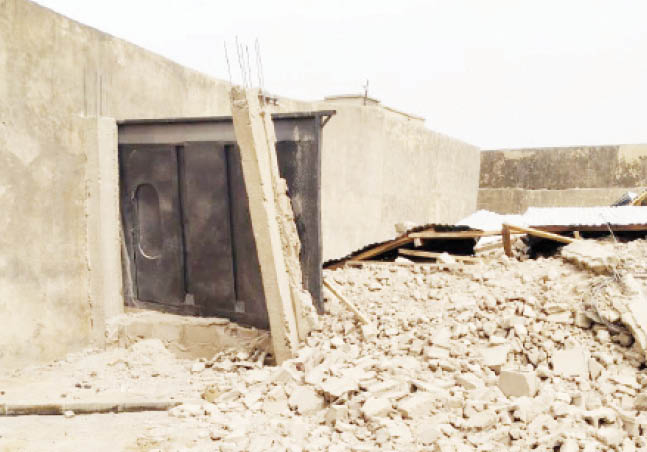Six days after the collapse of the 7-storey building in Oniru, Victoria Island, 28-year-old Kayode Akinwale, a carpenter, is yet to recover the body of his father, Mr Joseph Akinwale, who was trapped in the building.
His father was among the labourers who were sleeping at the site when the building caved in, killing several people.
- Nigeria, Africa losing out due to wrong perception — Daniel
- Lassa fever kills 170 Nigerians in 9 months as 6 die of monkeypox
Emergency officials have been combing the collapsed building site since penultimate Sunday after the incident had happened, recovering no fewer than six bodies.
Akinwale who said he would have been a victim said he believed his dad was still trapped in the rubble because he was among the labourers who were sleeping in the building when the incident happened.
But the Lagos Territorial Coordinator of the National Emergency Management Agency (NEMA), Mr Ibrahim Farinloye, told Daily Trust that rescue officers had reached ground zero.
“We have reached ground zero and the rubble has been cleared out of the building,” he said.
Akinwale and his dad worked as a carpenter and iron bender respectively at the site since the construction works reached the fourth floor.
Coming all the way from Ibadan to work at various construction sites in Lagos, the nation’s commercial capital, they had no inkling one of them would meet his untimely death in the course of “hustling”.
On the fateful day, the 7-storey building in the highbrow Oniru caved in, leaving many people dead.
Akinwale said, “I would have been a victim too but this particular Saturday, I went for another work at Ajah, that was why I didn’t sleep at the site but my dad was among the victims. I have been calling his number since the incident happened but it has never rung. I am 100 per cent sure he is still there in the rubble.
“It never happened that I would call my father for three days and his line would not connect. Since the incident happened, I just informed our family members today (Thursday) but as I am talking to you, we have not been able to recover his body. I can identify my father but I can tell you, he is not among those brought out from the rubble and I was told he was with his friend, a vulcanizer, who operates around the area until 9 p.m., when he went to sleep in the collapsed building.”
While he could not ascertain the number of people that were affected in the collapse, he said on a normal day during the week, close to 30 people usually slept inside the building.
‘Collapsed building hindering investments in real estate’
Speaking on the spate of building collapse disasters in Nigeria, President of the Nigerian Institution of Estate Surveyors and Valuers, Chief Emma Wike, said it is high time the government and the professional bodies sat together to confront the challenge.
He said the cases of building collapse have become a recurring decimal in the country.
He said the situation if not checked could discourage investment in the real sector.
“As it is going now, I think we have to take responsibility. I think the government should be able to prosecute those that are involved in this kind of menace that is happening to the real estate sector because it is really affecting the real estate sector.
“By the time somebody wants to invest in the real estate sector and they hear of what is happening in the country almost every day, the person will be discouraged or may not be willing to invest in that sector again.
“Because, by either commission or omission, a lot of things are not done well. I’m not saying that there is no building collapse outside Nigeria or in other countries but it is now an occurring decimal; happening almost every week or every two weeks or every month. That’s not good.
“I think it is time for the professional bodies that are in this environment and the government to sit down to rejig some legislation on the built environment especially considering the building code.
“Secondly, they should take responsibility for all these things and if possible prosecute those that are involved in the development and construction of those structures.
“The way it is going now, I think if we don’t reduce the number, it is going to affect investment in the real estate sector and that would not be good for us,” Wike said.

 Join Daily Trust WhatsApp Community For Quick Access To News and Happenings Around You.
Join Daily Trust WhatsApp Community For Quick Access To News and Happenings Around You.


